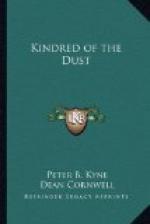He paused, too profoundly moved by consideration of the destitution that would face Nan and her nameless boy to voice the situation in words. But he looked up at Donald McKaye, and the latter saw again that wistful look in his sea-blue eyes—the dumb pleading of a kind old lost dog. He thought of the thirty-eight-foot sloop old Caleb had built him—a thing of beauty and wondrously seaworthy; or the sense of obligation which had caused old Brent to make of the task a labor of love; of the long, lazy, happy days when, with Caleb and Nan for his crew, he had raced out of the bight twenty miles to sea and back again, for the sheer delight of driving his lee rail under until Nan cried out in apprehension.
Poor, sweet, sad Nan Brent! Donald had known her through so many years of gentleness and innocence—and she had come to this! He was consumed with pity for her. She had fallen, but—there were depths to which destitution and desperation might still drive her, just as there were heights to which she might climb again if some half-man would but give her a helping hand.
“Do you know the man, Caleb?” he demanded suddenly.
“No, I do not. I have never seen him. Nan wrote me when they were married, and told me his name, of course.”
“Then there was a marriage, Caleb?”
“So Nan wrote me.”
“Ah! Has Nan a marriage certificate?”
“I have never seen it. Seems their marriage wasn’t legal. The name he gave wasn’t his own; he was a bigamist.”
“Then Nan knows his real name.”
“Yes; when she learned that, she came home.”
“But why didn’t she prosecute him, Caleb? She owed that to herself and the child—– to her good name and”
“She had her reasons, lad.”
“But you should have prosecuted the scoundrel, Caleb.”
“I had no money for lawyers. I knew I was going to need it all for Nan and her child. And I thought her reasons sufficient, Donald. She said it would all come out right in the end. Maybe it will.”
“Do you mean she knowingly accepted the inevitable disgrace when she might have—have—” He wanted to add, “proved herself virtuous,” but, somehow, the words would not come. They didn’t appear to him to be quite fair to Nan.
The old man nodded.
“Of course we haven’t told this to anybody else,” he hastened to add. “’Twould have been useless. They’d have thought it a lie.”
“Yes, Caleb—a particularly clumsy and stupid lie.”
Caleb Brent looked up suddenly and searched, with an alert and wistful glance, the face of the young laird of Tyee.
“But you do not think so, do you?” he pleaded.
“Certainly not, Caleb, If Nan told you that, then she told you the truth.”
“Thank you, lad.”
“Poor old Caleb,” Donald soliloquized, “you find it hard to believe it yourself, don’t you? And it does sound fishy!”




